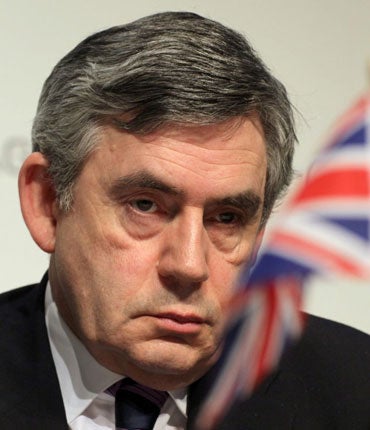Brown called before Iraq inquiry – but after the election
David Miliband and Douglas Alexander will also testify to Chilcot

Gordon Brown and two senior members of the Cabinet have been spared from giving key evidence to the Iraq inquiry until after next year’s general election amid accusations that ministers were being given special treatment.
The reprieve will allow Mr Brown, the Foreign Secretary David Miliband and the International Development Secretary Douglas Alexander to avoid the embarrassment of giving evidence before the general election. Sir John Chilcot’s inquiry team claimed that the decision had been made as it wanted to remain “firmly outside party politics”.
However, Jack Straw, who was the Foreign Secretary at the time of the Iraq invasion and remains in the Cabinet, will be questioned before the election. Tony Blair, the former Prime Minister, Alastair Campbell, his former spokesman, and Jonathan Powell, Mr’s Blair’s former chief of staff, will also give evidence before the start of any election campaign.
The inquiry team has already been honing in on Mr Brown’s pivotal role in funding the reconstruction of Iraq after the March 2003 invasion. The Treasury’s failure to provide the necessary resources has been raised by several military and Whitehall figures during the inquiry’s first round of public hearings. Lieutenant General Sir Freddie Viggers, Britain’s senior military representative in Iraq in 2003, said that “amateurs” in charge of the reconstruction effort led to “people getting killed as a result”. The decision to postpone his appearance until after the election means that the public may have to wait until as late as June to see the Prime Minister quizzed on the subject.
Nick Clegg, the Liberal Democrat leader, told the Independent last night that the public should be allowed to hear from those who were involved in the decision to go to war in Iraq before they cast their vote. “It seems a remarkable coincidence that all the ministers whose evidence will be so crucial to the conclusions of this inquiry will not be required to speak until after the election,” he said. “Voters have a right to know what made these ministers agree to such a catastrophic foreign policy decision before they decide whether to trust them with another term in Government.
“Gordon Brown was happy to sign the cheques for the war, it’s a pity he’s not so happy to explain his reasons for doing so.”
The Tories accused the inquiry team of giving into pressure from the Government not to politicise the proceedings, adding that Mr Brown had been trying to delay its final report. “Everyone will want to know whether this decision of the inquiry was influenced by ministers in any way,” said William Hague, the shadow foreign secretary. “The public will rightly ask why it is that numerous officials have given evidence to the inquiry about their role in carrying out the Government's policy on Iraq, but not a single minister has had to face questioning.
“Now we have the added effect of ministers not having to give evidence at all before the election. Gordon Brown’s efforts to delay the inquiry have been the very opposite of open and accountable government.”
Sir John Chilcot’s five-strong inquiry committee has already been criticised for its establishment links, which has led to suspicions that is has given the Government an easy ride so far. A spokeswoman for the Chilcot inquiry said that there had been no contact with No.10 over when Mr Brown would give evidence. The Prime Minister’s official spokesman said that he had “always been clear that he and ministers would cooperate fully with it”. He added that it was for the inquiry to decide who would give evidence and when they would give it.
The next round of public hearings, to take place in January and February, will see a string of big names appear before the inquiry. The committee had already confirmed that Tony Blair would be on the list, finally unveiled yesterday. Two of his closest advisers, who were involved in the drafting of the September 2002 dossier outlining the Government’s case for invading Iraq, have also been called.
Both Mr Campbell and Mr Powell are expected to be questioned about their influence over the dossier, which claimed Saddam Hussein had weapons of mass destruction that could be launched within 45 minutes. It has already emerged that Mr Campbell suggested 11 alterations to a draft of the dossier, overseen by intelligence chief, John Scarlett. In a private email, Mr Powell also asked Mr Campbell about the headlines they hoped to produce with the final dossier.
The inquiry will also hear from Elizabeth Wilmshurst, a senior lawyer within the Foreign Office, who resigned her post after concluding that the invasion was illegal without further clearance from the United Nations. Lord Goldsmith, the former attorney general who is understood to have had doubts over the legality of the 2003 invasion, will also give evidence.
Join our commenting forum
Join thought-provoking conversations, follow other Independent readers and see their replies
Comments